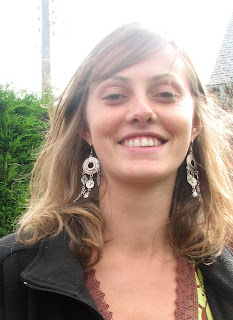It seems I was fated to live with deafness.
My mother was losing her hearing well before I was born. By the time I was adult and she was elderly she was quite deaf. I wasn't particularly patient or sympathetic.
Tom, still younger than she was then, is now deafer than she ever was. His loss of hearing has been rapid and steep, and getting steeper. We first noticed it around the time we were first married, 12 years ago, when we went for a walk to look at an eclipse of the moon. I remarked on how astonishingly loud the grasshoppers were, and he said what grasshoppers? A few years later, he was apparently ignoring people who spoke to him from one side or a distance, sometimes causing tension or misunderstanding.
When we first came here, we had no television. We listened to the radio, enjoying the early evening comedies, the News Quiz, 'Clue, Dead Ringers (always better on radio), but progressively these became impossible for him. We got television. The television grew louder and louder; I would ask for it down, frustration and argument ensued. When I spoke and he couldn't understand, I was mumbling. I remember my mother accusing my father of mumbling, which he did rather. Worsening communication for whatever reason can, of course, lead to a loss of confidence in what you have to say. She very largely gave up on television, or had it on very loud. Fortunately my father was fairly hard of hearing too. In fact I do have a very poor voice for deaf people, crackly and not low, childish, range and volume limited, jagged when I raise it, as my teaching tutor once pointed out, I've learned to project it better of recent years.
This was possibly the worst time; unhappiness,bewilderment, denial, resentment abounding and rebounding around the walls with the evening news. When he finally had a hearing aid, and turned the set on to the volume it had habitually been, he apologised for subjecting me to it and risking my hearing as well. At some point we discovered teletext subtitles, which were a help.
With some support and encouragement from friends, he finally had a test, some four or five years ago. It confirmed a loss of around 30%, which must be significantly more by now. Cost and inertia, some resistance, meant he didn't go for the hearing aid straight away, but was able to adjust to the fact, to accept and tell people that he was deaf. The fear and misery around it ebbed.
I have said ruefully that our mother spent our inheritance on hearing aids, which were mostly not used, broken, not serviced and otherwise abandoned. Those who supply hearing aids say complacently that most people settle down with them satisfactorily after a period of adjustment and tuning. I feel the truth is more that most people resign themselves one way and another to their limited usefulness. Tom has not only lost volume, but more importantly, definition of sounds, and whole areas of pitch. Mozart, he says, is full of holes, and I imagine the music unravelling like dropped stitches in knitting. Hearing aids can do little to redress these problems. I would say though, it is necessary to be persistent with going back and having the instrument retuned; computer technology exists now which comes far closer to allowing a hearing technician into the person's head to hear what they hear, and a good and experienced one will take time and trouble to adjust it. However, it has now rather reached the point for Tom, where to crank up the higher sounds any more would mean that every knife put down on the kitchen counter would be an unbearable explosion, while making little difference to the subtleties of human speech. One of its main useful functions has been that he can hear himself better, so doesn't talk so loud one to one or with small numbers, but then he better accepts me telling him when he's talking too loud now anyway.
More useful in some ways than the hearing aid is a set of cordless stethoscopic earphones which enable him to hear TV and music, even through walls and at quite some distance. Watching him some way down the garden animatedly conducting the Sibelius symphony I was watching on the Proms was a funny moment. They have made some pleasures possible again, but reinforce his isolation in other ways, and we fear that feeding high levels of sound into his ears in the way they do may be ultimately worsening the condition. I can't easily reach him to communicate when he's using them. In the open-plan, free-flowing space we live in, it is quite useful to be able to enclose ourselves in our own bubbles, I sometimes use the phones myself if I want to watch something he doesn't, particularly while doing something else where I need to move about, the sound quality is excellent. But the walls of these private spaces are not porous, we can't toss a question, exchange casual remarks. Or rather he can, I can't, and if he does he won't hear the reply. Watching TV together, we can't really share the jokes, comments, reactions to what we're watching. Having been around people who compulsively chatter and commentate through films, this is not necessarily a bad constraint...
Subtitling is also a benefit I've come to quite appreciate, and we bless the advent of DVDs which almost always supply it, just when watching videotapes was becoming impossible. I've grown quite reliant on it too, especially with films where the screen dialogue seems woefully lower in volume than all the bangs and crashes and incidental music of the soundtrack, and apparently quite important things are said off-screen which are completely inaudible. Television subtitling often obscures too much of the picture, and on live programmes and news is sometimes wildly out, sometimes amusingly so, like when they said Prince William's girlfriend had been remarkably sportive for the last three years ( I think they meant supportive...)
Loss of hearing set in at the same time as we came to France. It soon became clear Tom was not going to make much progress in understanding French, though he has made some; distinguishing sounds being difficult in his first language, it is naturally more so in another. This makes life more difficult for him, but has done much for both my confidence and my French. Old-fashioned gender stereotyping prevailing as it tends to in our marriage, where he does money and building, and I do cooking, and er, yes cooking, and most of the housework, and yoga with Emilie, and coffee with Fi, and blogging... oh, and putting drops in the dog's ears ( in fact, we're neither of us incompetent at any of those things, we just have our preferences, except he couldn't put drops in the dog's ears, and would probably get tired of yoga and coffee, ), I feel it redresses the balance somewhat when I have to take charge sometimes and do the more worldly stuff. Additionally, being here means we can have private conversations in public places as loudly as necessary with less concern that people are listening to us, or we are intruding on them.
I do very little cussing under my breath when he gets on my nerves, but if I want to, the option is there and he won't hear me...
And yet, and yet. It's perhaps easy enough for me to speak Pollyanna-ishly about the silver linings, I only live alongside his deafness, not inside it. The erosion of beloved music, one of the most important things throughout his life, the alarm when sounds which have become distorted, liminal, unidentifiable, the sudden clatter of the spin drier in the other room, the crack of a plastic bottle expanding, press formlessly and alarmingly against the curtain of deafness, or the sorrow that just when he finally realised he could actually make friends, be socially at ease and appreciated for the charm and humour he never fully knew he had before, he must now feel partially excluded from their conversations - people are kind and make efforts, but that is a difficult one; too much and he feels like an object of pity, a source of embarrassment, not enough and he's out of it - all of these losses, and more, I do not experience directly.
My mother, though no great socialite or people-person, relied very heavily for her sense of self and self-worth on her relationships with her outer world, specifically her children. Being withdrawn by deafness from verbal communication with us lessened her. We raced on without her, talking together sometimes as if she wasn't there. The stimulus of conversation reduced, rather out of the current of things, she became vague, slow, stewed too much on past things, resentments.
It is easy to condemn as unjust and ignorant the perception of deaf people as slow or stupid, but it requires examining. Eventually if you cannot receive certain stimuli, you will become dull to them. Think of the word intelligent. For Tom, much of the spoken world is becoming
unintelligible, he can make less and less sense of it. And the presumption that not having heard equals not understanding, therefore stupidity, is sometimes one that he takes on himself, it is not imposed on him. So when I have read out loud from something 'Brahms', but he has heard 'Mahler', and continues under the assumption it is Mahler in the case, until I tell him that it isn't, I was reading from text so I wouldn't have said one when I meant the other, he may well jump to a defensive 'You're saying I'm an idiot, how do you know it wasn't your mistake?', when all I'm saying is he must have misheard. But such occurences are doubtless inevitable, and quite possibly go with the age gap territory; loss of certain powers do not equal loss of self, but it sometimes feels as if it does, no doubt. He does OK.
Others, like my sister-in-law, whose hearing loss began much earlier than Tom's, but is I think now slightly less severe, expend huge efforts, and put themselves under a lot of strain, in anticipating, interpreting, looking for cues and clues, and generally pretending understanding, which he doesn't, though he does sometimes laugh along with a conversation and respond to the general atmosphere when he hasn't heard what's been said. His mis-hearings are astonishing, dada-esque, bizarre and sometimes hilarious, bearing no resemblance to any remote probability of what I might have said. I always mean to write them down.
But, withal, I think I can truly say that for him, the loss of social interaction and conversation is not as hard as it was for my mother, or would be for many others. His greatest source of strength has never been the world 'out there' but his inward life, one of ideas, mathematic, scientific, spiritual, and a personal imagery and narrative of remarkable vitality, clarity and strength, fed by meditation, reading and writing. Of late he has voiced the sentiment that perhaps going deaf has enabled him greater access to his inner world, which is largely where he prefers and needs to be, and to push the sometimes abrasive, angering outer one further to the margins.
But he also needs me, and I him. I would not have him retreat into a 'world of his own', while I go about my business in a parallel existence, simply supplying one anothers basic needs, relying solely on touch and eye contact, which, without a more complex understanding, would surely lose something. Communication was ever our sure foundation, now it needs extra care.
Conversation while travelling in the car is difficult, best avoided at trickier driving moments. I can't speak to him over my shoulder casually, or from another room. It is perhaps similar to being with someone whose first language is not the same: one must talk clearly and precisely, start and finish sentences properly, generally better to form the thought fully before voicing it, and not expect to be picked up and followed automatically. A delicate point of negotiation is who makes the move toward whom to facilitate hearing. Protracted conversation requires more energy and effort and becomes tiring on both sides, a raised voice can easily be conveyed and received as an impatient or one, generalised frustration and anger at communication thwarted can seem to be directed at the other person. Yet in more relaxed, intimate situations sometimes the barrier can seem to soften, be momentarily forgotten; it is as though tension and strain can set up its own resistance to mutual understanding.
He reads this, most of the time. Not until after I've published and I rarely talk about what I'm writing beforehand; I don't write it especially for him and I don't feel I need his approval, I do not see this as a channel of private communication with my husband! I have said that I wouldn't want him to submit comments, but I didn't see why I should be able to make what I wrote available to the world at large and not to him. (I have the impression most people's husbands/wives/partners/significant others do read their blogs, or can if they wish... I don't know how others feel about this?) Having this opportunity of expressing myself truthfully and sometimes intimately, but in a way I wish to be heard, has become a valued outlet, in ways I hadn't foreseen, and also, sometimes, something I can share or offer to him.
People meeting Tom for the first time are often shocked, embarrassed or distressed by the extent of his deafness, which he never tries to conceal. Their compassion is appreciated. But as I watch him now working in the next room, singing, giving me an intermittent commentary I'm not obliged to respond to, talking nonsense to the dog, and I think of how full of plans and projects and dreams he is, I am somewhat surprised that this is a man who is 70 next month, and who seems to me to be neither failing nor unhappy. He may struggle to keep up in company, but he has a degree of presence in any conversation, his voice and delivery have weight, and should this ever veer toward pomposity, the word 'gravitas!' and a wink will surely suffice to leaven it.
It was a relief to escape my mother's deafness, I longed to enter a real, normal, world out there, without such annoyances. Now I see that the real, adult, world is one filled with unexpected contingencies, where you have to take what comes and work with it, again and again, with sermons in stones and blessings in adversities, if you're lucky. The difference in our ages being as it is, it always stood to reason he would come to need me one way or another. But because emotional neediness, dependence, imbalance was not part of the deal when we came to one another, necessity now is only an easy yoke, a really very light burden.


 This is how you got to and from Gymea. There were no jetties or anything, you just pulled the canoe up onto the beach. (That's me paddling ineptly in the front, and Mikey, looking like the second last of the Mohicans in the middle. He didn't much like being a passenger.)
This is how you got to and from Gymea. There were no jetties or anything, you just pulled the canoe up onto the beach. (That's me paddling ineptly in the front, and Mikey, looking like the second last of the Mohicans in the middle. He didn't much like being a passenger.)





 So, armed with my new knowledge, I set off to get up close and personal,
So, armed with my new knowledge, I set off to get up close and personal, to say nothing of low down and dirty,
to say nothing of low down and dirty, 
 and their denizens.
and their denizens.


 Little did I know, however, while taking an insect's eye view of everything, that this wee hole I was jamming the lense up to was none other than the entrance to...
Little did I know, however, while taking an insect's eye view of everything, that this wee hole I was jamming the lense up to was none other than the entrance to...


 As you can see, she's very beautiful. Mind you her mum's pretty gorgeous too,
As you can see, she's very beautiful. Mind you her mum's pretty gorgeous too,




 anything with wood in goes in wood,
anything with wood in goes in wood,

 and everything else goes into tout-venant.
and everything else goes into tout-venant.










 Not ideal subjects for photography, though at least they keep still - they've been in the same place for several nights now, the antithesis of shooting stars really, while still being ephemeral little things with fiery tails.
Not ideal subjects for photography, though at least they keep still - they've been in the same place for several nights now, the antithesis of shooting stars really, while still being ephemeral little things with fiery tails. 








